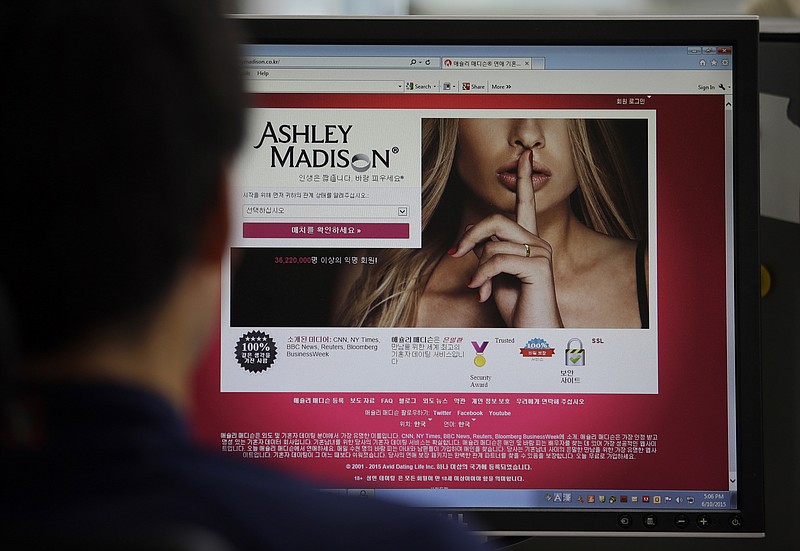Read more
Local, federal employee emails turn up on hacked adultery website database
Let's face it. If United States government websites with the most sensitive of information are easily hacked, all of our online information is vulnerable - if somebody wants it badly enough.
We can take all the experts' suggestions and buy all the computer protection available, but even the most cautious people have learned that because of rapidly advancing technology they're not nearly as safe as they thought they were.
It's bad enough to have your personal information pirated, but, as 35 million users of the Ashley Madison dating site and social networking service are finding out, it's even worse if you're doing something you wanted kept quiet - very quiet.
The Canada-based Ashley Madison site, which has more than 124 million visits per month, is marketed to people - overwhelmingly men - who are married or in a committed relationship. Its slogan is "Life is short. Have an affair." Its advertised hallmarks are discretion and security.
How many is 35 million? It's more than the population of any state but California. It's more than the combined population of Tennessee, North Carolina, Georgia, Alabama and Mississippi. If all the website users were in the U.S., one out of every nine people would be a client.
One in 22 area residents in 63 Chattanooga area ZIP codes surveyed by the Times Free Press from released information, are Ashley Madison clients. That is comprised from 32,075 accounts out of a population of 714,918 in an area from South Pittsburg to Cleveland, Tenn., and from Dayton, Tenn., to Dalton, Ga.
Hackers, who threatened in July to post personal information about users if the site wasn't closed down, made good on their threat by releasing data - even including clients' sexual proclivities - on Aug. 18 and again on Aug. 20. That included information by users who paid $19 to allegedly have their data deleted. Some of those had had accounts set up against their will, as a prank or due to mistyped email addresses.
It didn't take long for the first lawsuits to be filed, and they aren't against the group known as "The Impact Team" that did the hacking. They're against Avid Life Media, the company that owns Ashley Madison, and they're class-action suits.
One, for instance, says that because of the company's "unfair, unreasonable and inadequate data security, its users' extremely personal and embarrassing information is now accessible to the public."
They won't be the last of the lawsuits filed over this situation, either, or over the likely copycat hacks that are bound to follow given the nervous husbands, government officials and prominent people squirming after the Ashley Madison data dump.
Media already have reported on suicides that occurred after the release. Broken marriages, job resignations and election defeats are sure to follow.
Not surprisingly, online companies even have waded in to offer help to exposed clients who have had their email addresses searched following the leak. But, surely, once burned, twice shy, right?
Some of the exposed individuals undoubtedly are innocent. The potential for damage to them is enormous.
But subtract that small number, and you still have a large number of potential relationship cheaters.
That, in turn, leads to the moral dilemma - are those whose names were exposed victims or perpetrators?
Both, really.
It may be naive to say, as a local high school teacher did years ago, that the "only thing I do behind my wife's back is zip up her dress." But those who don't cheat rarely have anything to worry about.
Yet, when a data dump can suddenly and without warning expose the personal information of 35 million people, we all have something to worry about. After all, it might not be a dating website, but it might be a seemingly harmless social networking site, an online banking site or - as a former U.S. secretary of state has learned - an unsecured server.
Once information is exposed, it can't be jammed back into cyberspace. It's out there for generations to see and make judgments upon.
"The Impact Team" and its ilk may be - and should be - caught and prosecuted to the fullest extent of the law. Cyberterrorism is the cancer of the 21st century. In the mid-1900s, cancer was almost always deadly. Today, because we made it a priority, cancer is almost always treatable and often curable.
If cybersecurity isn't made a similar priority by government and private business, Ashley Madison will be just the little blonde girl who lives across the street compared to what could happen.
